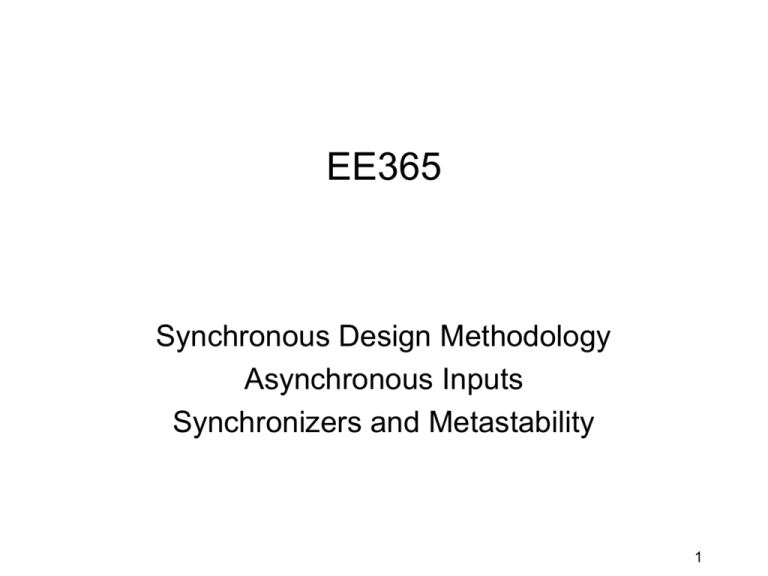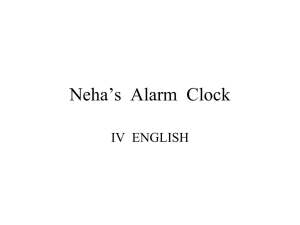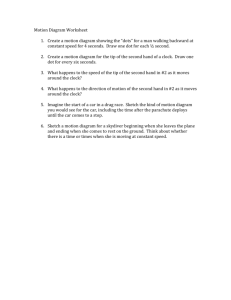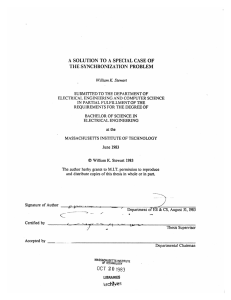Synchronous Design Methodology & Asynchronous Inputs
advertisement

EE365 Synchronous Design Methodology Asynchronous Inputs Synchronizers and Metastability 1 Synchronous System Structure Everything is clocked by the same, common clock 2 Typical synchronous-system timing • Outputs have one complete clock period to propagate to inputs. • Must take into account flip-flop setup times at next clock period. 3 Clock Skew – Clock signal may not reach all flip-flops simultaneously. – Output changes of flip-flops receiving “early” clock may reach D inputs of flip-flops with “late” clock too soon. Reasons for slowness: (a) wiring delays (b) capacitance (c) incorrect design 4 Clock-skew calculation • tffpd(min) + tcomb(min) - thold - tskew(max) > 0 • First two terms are minimum time after clock edge that a D input changes • Hold time is earliest time that the input may change • Clock skew subtracts from the available hold-time margin • Compensating for clock skew: – Longer flip-flop propagation delay – Explicit combinational delays – Shorter (even negative) flip-flop hold times 5 Example of bad clock distribution 6 Clock distribution in ASICs • This is what a typical ASIC router will do if you don’t lay out the clock by hand. 7 “Clock-tree” solution • Often laid out by hand • Wide,fast metal (low R ==> fast RC time constant) 8 Gating the clock • Definitely a no-no – Glitches possible if control signal (CLKEN) is generated by the same clock – Excessive clock skew in any case. 9 If you really must gate the clock... 10 Asynchronous inputs • Not all inputs are synchronized with the clock • Examples: – Keystrokes – Sensor inputs – Data received from a network (transmitter has its own clock) • Inputs must be synchronized with the system clock before being applied to a synchronous system. 11 A simple synchronizer 12 Only one synchronizer per input 13 Even worse • Combinational delays to the two synchronizers are likely to be different. 14 The way to do it • One synchronizer per input • Carefully locate the synchronization points in a system. • But still a problem -- the synchronizer output may become metastable when setup and hold time are not met. 15 Recommended synchronizer design • Hope that FF1 settles down before “META” is sampled. – In this case, “SYNCIN” is valid for almost a full clock period. – Can calculate the probability of “synchronizer failure” (FF1 still metastable when META sampled) 16 Metastability decision window 17 Metastability resolution time 18 Flip-flop metastable behavior • Probability of flip-flop output being in the metastable state is an exponentially decreasing function of tr (time since clock edge, a.k.a. “resolution time”). • Stated another way, MTBF(tr) = exp(tr /t) / [T0 f a] , where t and T0 are parameters for a particular flip-flop, f is the clock frequency, and a is the number of asynchronous transitions / sec 19 Typical flip-flop metastability parameters MTBF = exp(tr /t) ________ [T0 f a] MTBF = 1000 yrs. F = 25 MHz a = 100 KHz tr = ? 20 Is 1000 years enough? • If MTBF = 1000 years and you ship 52,000 copies of the product, then some system experiences a mysterious failure every week. • Real-world MTBFs must be much higher. • How to get better MTBFs? – Use faster flip-flops • But clock speeds keep getting faster, thwarting this approach. – Wait for multiple clock ticks to get a longer metastabilty resolution time • Waiting longer usually doesn’t hurt performance • …unless there is a critical “round-trip” handshake. 21 Multiple-cycle synchronizer • Clock-skew problem 22 Deskewed multiple-cycle synchronizer • Necessary in really high-speed systems • DSYNCIN is valid for almost an entire clock period. 23








